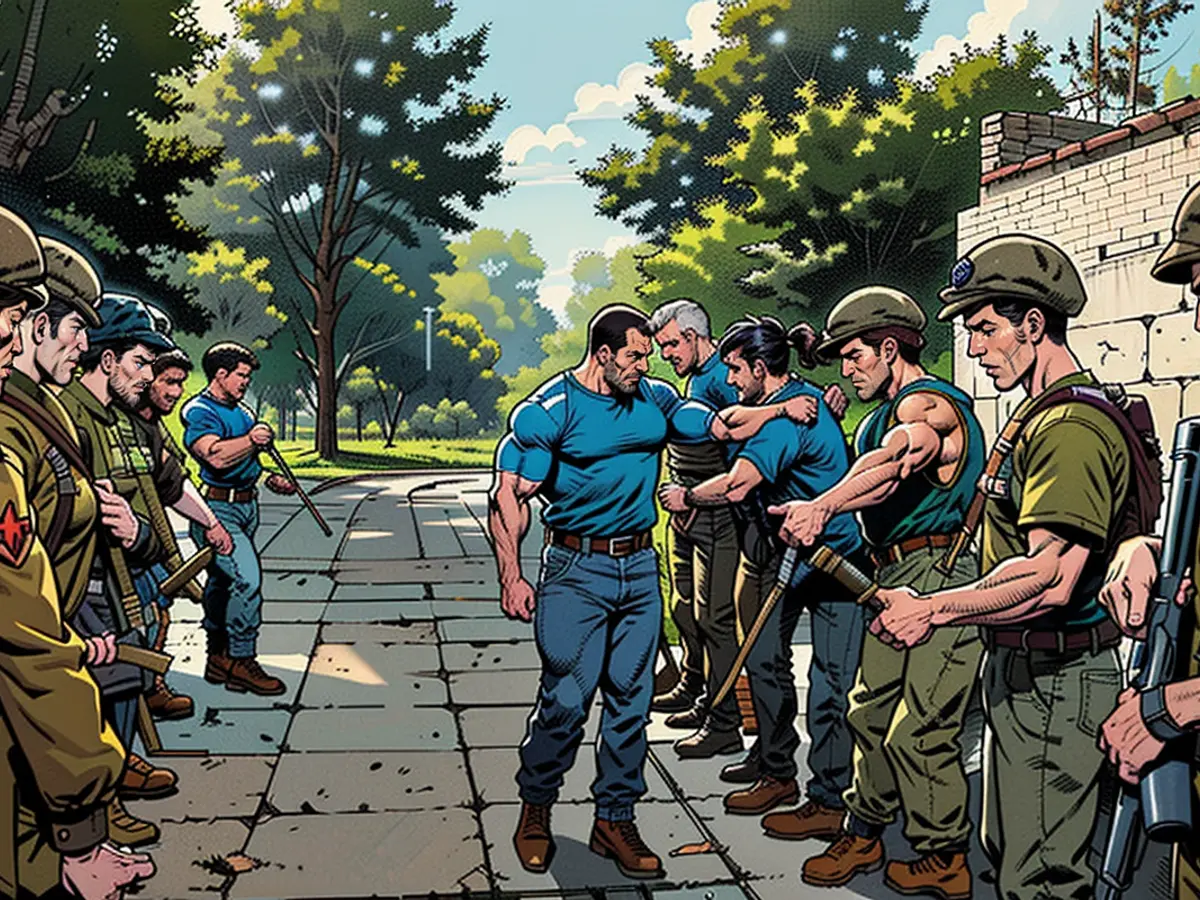Ukraine has recruited more than 3000 prisoners
Ukraine urgently needs new soldiers. A new law allows for the recruitment of prisoners as well. However, things run differently in Ukraine than in Russia. Thousands of soldiers have already been recruited in this way - and there could be more.
In a rural penal colony in the southeast of Ukraine, several inmates stand before a barbed wire fence and listen to a military recruiter who offers them a deal: You can get parole if you join the fight against the Russian invaders. "You can end this here and start a new life", the man from a volunteer assault battalion says. "The main thing is your will, as you will be defending your homeland. You won't have a 50% chance of success, you have to give 100% of yourself, even 150%."
Russia's war of aggression has been going on for more than two years. Ukraine urgently needs more forces on the battlefield. Now, hundreds of thousands of additional men are to be conscripted. For the first time, Ukraine is turning to an untapped potential in its recruitment: imprisoned criminals. There are no official figures on the number of Ukrainian soldiers or casualties involved. However, commanders at the front admit openly that they are facing serious personnel problems. With the Russians strengthening their troops in Eastern Ukraine and advancing towards the west, the situation is critical.
More than 3000 inmates have already been released on parole and assigned to military units after the parliament passed this recruitment method as part of a controversial mobilization law in May. According to Ukrainian Vice Justice Minister Olena Wysozka, approximately 27,000 convicted criminals could be eligible for the new program. Wysozka stated that for many potential recruits, "returning home as a hero instead of being in prison" is a powerful motivation. The interest in the parole program has exceeded expectations, potentially bringing in up to 5000 new recruits - "that would definitely help".
"It's stupid to sit here and do nothing"
Ernest Wolwatsch wants to accept the offer. The 27-year-old was sentenced to two years in the Dnipropetrovsk region penal colony for robbery. He works in the kitchen, filling plates with food. "It's stupid to sit here and do nothing", he says. According to his own account, he has wanted since the beginning of the war to "do something for Ukraine" and to have the opportunity to enlist in the military. Now he has a chance.
For Ukrainian soldiers in active service, it is generally the rule that their last name or a pseudonym is used for security reasons. Many inmates in the penal colony asked to be identified only by their first names to avoid problems with their military service. Among them is the 30-year-old Volodymyr, who makes metal bolts in the workshop of the penal colony. He wants to join the armed forces voluntarily when he has served his sentence in a year, but not yet. Under the parole program, there is no home leave.
Before potential release, prisoners are interrogated and medically examined. Unlike in Russia, not every prisoner is eligible for the program. Those convicted of rape, other sexual assaults, murder of two or more people, or crimes against national security are not recruited.
Ukrainian officials are careful to distinguish their offer from the Russian recruitment of prison inmates for the infamous Wagner mercenary group. Those fighters are usually thrown into the deadliest battles. The Ukrainian program, on the other hand, aims to integrate released prisoners into regular Ukrainian units at the frontline.
Criticism of Prison Conditions
According to EU-guided government statistics, approximately 42,000 people are incarcerated in Ukraine. Youngest reforms have reduced the number of inmates and improved conditions in some facilities, but there is ongoing criticism from the outside regarding the treatment of certain prisoners. The US State Department, in its Human Rights Report 2023, mentioned credible reports of "degrading treatment or punishment" by prison authorities.
Anyone who has qualified for release through good conduct is quickly sent to camps where they learn to handle weapons and other essential combat skills. The training is later supplemented and completed after integration into individual units.
Mikhail, who was released, completed an assault course and says it was difficult to meet the physical demands. After months of relative inactivity in prison, it's now about climbing into armored personnel carriers and then getting out and completing obstacle courses. "I decided to enlist in the Ukrainian volunteer army because I have a family at home, children, parents," the 29-year-old explains, having to drown out the noise of a nearby firing range. "I will be more useful in the war."
The 'Attack on Ukraine' by Russia has led to a significant need for more military personnel. As a result, Ukraine has resorted to a controversial measure, allowing the recruitment of prisoners as soldiers to combat the invasion. This approach has seen over 3000 inmates released on parole and assigned to military units, with potentially thousands more eligible.
The recruitment of prisoners for military service is a topic of politics in Ukraine, with some viewing it as a necessary measure in the face of the ongoing 'Wars and conflicts', while others criticize the conditions in Ukrainian prisons and the implications of this recruitment method.









